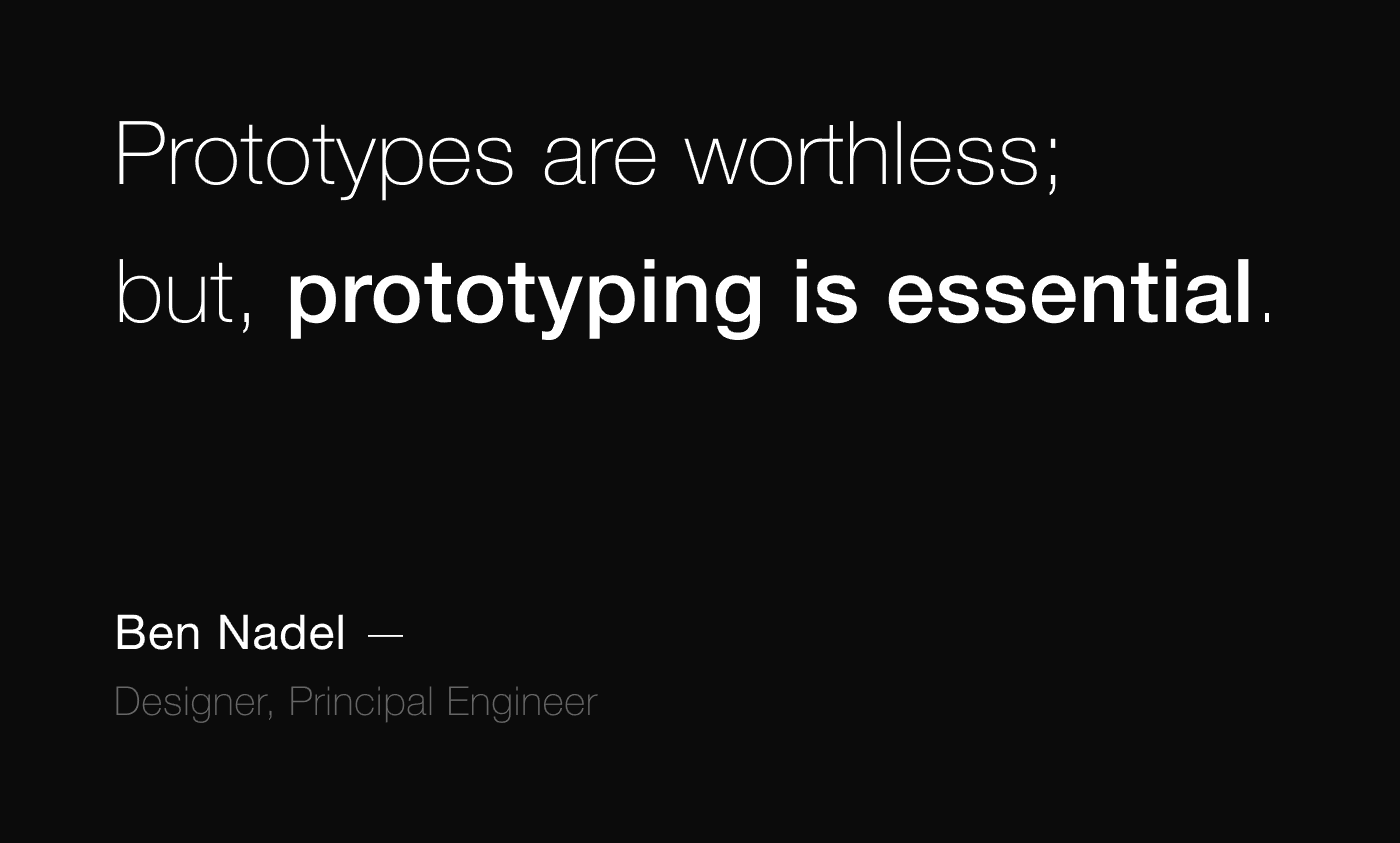Prototypes Are Worthless, But Prototyping Is Essential
Over the last two weeks, I've been working on a proof-of-concept for a feature augmentation that I want to pitch at work. It's been quite a while since I put on my "product hat"; so, I was excited to get down-and-dirty with the process of fleshing out a prototype. As always, I started with low-fidelity, pen-on-paper sketches. I absolutely love sketching; and, I find that it helps me explore an idea with complete freedom. Once I was happy with my sketches, I created an interactive prototype using Studio and InVision. And, finally when I was happy with the state of my prototype, I started to implement the feature in HTML, JavaScript, and CSS.
| |
|
|
||
| |
 |
|
||
| |
|
|
As I was going through this process, I was reminded of just how much I get "wrong" in each step. The beauty of sketching and prototyping is that it's low-cost; and, creates artifacts that are - theoretically - easy to throw away. But, I am an emotional animal. And I am out of practice. And every aspect from one step that didn't quite translate to the next step felt like a personal failure.
At times, I even berated myself - I started to question how I ever thought "this" was a good idea or "that" was a good idea and, "what the heck was I thinking anyway?!"
And then I had a moment of clarity. I remembered something Rich Armstrong - my engineering manager - said to me: "Plans are worthless; but, planning is everything." This Dwight D. Eisenhower quote put everything in perspective.
I realized that each step in this process didn't create a "source of truth", it created a "source of inspiration." And, if something didn't translate to the next level of fidelity, leaving it out was a product of evolution, not the result of failure.
Every step of the product ideation process is naturally infused with less information when compared to the step that follows it. As such, every step operates somewhere in the "fog of war". And, the artifact produced at each step is nothing more than a "best guess" as to what will make sense. That best guess may end up being incomplete; but, we arrive at that best guess through experimentation, introspection, and - most importantly - deep thinking about the product and the user requirements.
So, to paraphrase Eisenhower, "Prototypes are worthless; but, prototyping is essential."
I believe this perspective can help one move more gracefully through the ideation process. But, I also believe that this perspective can help build empathy in our engineers.
As someone who is usually on the implementation side of a prototype, I can attest to the fact that I see designs all the time that make [in part] no sense. Or, that would cost far more to build when compared to the relative value they would add. And, it's easy to question what the designer was thinking?
But, with this new perspective on prototyping, we engineers can embrace the idea that prototypes aren't perfect. The designer formulated an idea using all the information that they had on-hand. And the result of that ideation is a best-guess. So, when it comes time to implement that best-guess, if something doesn't make sense, we shouldn't blindly copy it, we should open a dialog.
Each level of increasing fidelity contains new information and identifies new constraints. And, if that journey doesn't work to reshape the original idea, something is wrong with the process.
At the end of the day, we all have honorable intentions; and, we all want to build something great. But, we're also human and we're flawed and we don't get everything right. And to believe that our prototypes somehow transcend our human condition and our constrained set of insights will only serve to limit what we can achieve. Prototyping is, without a doubt, a critical part of the ideation process. But, we must accept that our prototypes are not perfect.

Reader Comments
I have never commented on your posts, but decided today was the day.
I just want you to know that of the blogs, etc. that I follow, yours is the most consistent and enjoyable at the same time. I enjoy the way you convey your problem solving and the way you share your "Ah ha!" moments.
Thanks for keeping this blog going. I look forward to it!
Ditto!
@Mark(s),
Thank you very much. I really appreciate it! Especially to hear it about posts like this which are outside of my normal writing and, possibly, a little more controversial.
@All,
In the ongoing struggle against the anxiety I have over the things I am building, I recently heard something on a Freakanomics Podcast episode that I found be very liberating. The idea that "inspiration is for amateurs" and that the rest of us just show up and get to work. And that the process of working will, in and of itself, unlock new doors and new opportunities.
www.bennadel.com/blog/3576-so-mediocre-they-can-t-ignore-me.htm
I was delighted to run across this today, only about an hour after I'd repeated that exact same Eisenhower aphorism when discussing code revisions! I like your rephrasing, it gets to the heart of it.
@Kevin,
I'm glad you enjoyed it. Code revisions are especially interesting to think about because there's the problem you have "now" and the problems you "may have" in the future. I know I've been sucked into the situation where I start solving for problems I don't yet have because they feel like the right approach; but, then, it gets overly complicated and I never end up need the complexity anyway.
Another way to think about all of this is a phrase I enjoy:
It feels on-point. Formulating ideas; then, being able to let go of those ideas if they prove to be less-than-helpful later on.